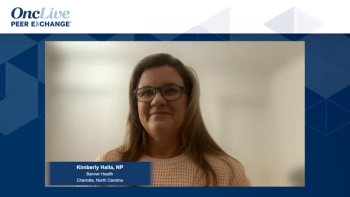
Gynecologic Cancers
Latest News

Latest Videos
More News

In this episode of The Vitals, we recount the oncology drugs that received FDA approvals in 2022.

Maintenance therapy with rucaparib monotherapy improved progression-free survival compared with placebo. However, the treatment also significantly elevated anemia and neutropenia rates in this setting.

Nurse Practitioner Kathleen Lutz talks about the efficacy of chemotherapy in patients with endometrial cancer, and how she discusses the chance of disease recurrence with patients.

Continuing her discussion, Kathleen highlights the most common adverse events she sees in patients treated with chemotherapy for advanced endometrial cancer who are unfit for surgery.

Kathleen Lutz, RN, NP-BC WH, explains the most commonly used first-line treatment options in patients with advanced endometrial cancer who are unsuitable candidates for surgery.

The panel reviews the current treatment modalities for endometrial cancer and in what circumstances each is considered for a patient.

Lenvatinib is approved in combination with pembrolizumab for the treatment of patients with advanced endometrial cancer who have disease progression after systemic therapy, are not candidates for curative surgery or radiation, and who are mismatch repair proficient or not microsatellite instability–high.

Dostarlimab plus standard-of-care chemotherapy, followed by dostarlimab alone, met a predetermined progression-free survival end point in the phase 3 RUBY trial.

The panel shares how they determine a treatment regimen for patients with advanced endometrial cancer taking into consideration fertility and family planning, hereditary conditions, and comorbidities.

Kathleen Lutz, RN, NP-BC WH, presents a 76-year-old woman with advanced endometrial cancer, and the panel assesses the chosen treatment regimens.

Cancer Has No Gender: Challenging Assumptions and Improving Quality of Care for the LGBTQ+ Community
Improve care for LGBTQ+ patients with cancer by learning about disparities, focusing on patient-centered treatment, and not making assumptions about patients and their loved ones.

Zimberelimab demonstrated encouraging efficacy with a tolerable safety profile in patients with PD-L1–positive recurrent or metastatic cervical cancer who had progressed after first- or subsequent-line, platinum-containing chemotherapy.

Certified Nurse Practitioner Kimberly Spickes shares the educational and supportive resources she recommends for patients with newly-diagnosed advanced endometrial cancer.

Nurse Practitioners Kathleen Lutz and Kimberly Halla describe the conversations they have with patients with advanced endometrial cancer before and after diagnosis and the common questions they hear.

Kimberly Halla, NP, explains the staging of endometrial cancer and the standards for biomarker testing at her institution.

Kimberly A. Spickes, CNP, gives an overview of the typical symptoms women with endometrial cancer present with, discusses how these symptoms are similar and different from those seen with other gynecologic malignancies, and reviews risk factors for endometrial cancer.

Increasing the duration of bevacizumab treatment did not improve progression-free survival for patients with ovarian cancer.

Mirvetuximab soravtansine-gynx, an antibody drug conjugate, has received accelerated approval for platinum-resistant ovarian cancer. The prescribing label comes with warnings for visual toxicities, pneumonitis, and peripheral neuropathy.

During the 40th Annual Chemotherapy Foundation Symposium, Eirwen M. Miller, MD, evaluated the safety and efficacy profiles of different PARP inhibitor therapies for patients with advanced ovarian cancer.

Immunotherapy has changed the face of cancer treatment, but requires appropriate irAE management to reach full potential.

Olaparib is an oral drug manufactured in 150-mg and 100-mg tablets. Olaparib is taken by mouth, twice daily. It can be taken without or without food.

Patients with heavily pretreated clear cell gynecologic cancer achieved encouraging responses with single-agent pembrolizumab.

An analysis of patient-reported outcomes showed that patients with advanced ovarian cancer experienced fewer abdominal or gastrointestinal toxicities with mirvetuximab soravtansine than with chemotherapy.

A combination of the aromatase inhibitor letrozole and the CDK4/6 inhibitor abemaciclib may help patients with recurrent estrogen receptor–positive endometrial cancer achieve responses.

Neratinib was associated with a clinical benefit rate of 45.5% among patients with metastatic or recurrent HER2-mutated cervical cancer.




